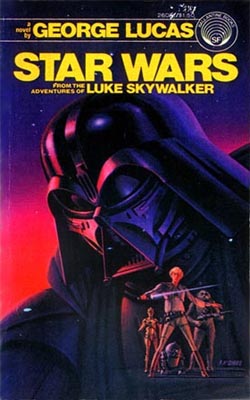 Mike: Sometimes you can know something without really being conscious of it—and often you can be very much aware of something without fully grasping its implications. One such fact occurred to me recently: getting a new Star Wars film every year means that there is every reason to believe that we will also be getting one film novelization every year. In perpetuity.
Mike: Sometimes you can know something without really being conscious of it—and often you can be very much aware of something without fully grasping its implications. One such fact occurred to me recently: getting a new Star Wars film every year means that there is every reason to believe that we will also be getting one film novelization every year. In perpetuity.
Going off of Del Rey’s recent publishing schedule (though Disney-Lucasfilm Press adds an interesting new dimension to this), that amounts to roughly one in five “adult novels” from now on. When the prequels were coming out, there were around seven adult novels per year instead of five, and of course only one movie every three years—meaning roughly five percent of Del Rey’s output at the time was novelizations, versus twenty percent now. That’s a huge shift.
Now, I’m not here to say I want to return to seven original Star Wars novels every year. Even with the excitement of the new canon, what we’ve gotten over the last couple years has been more than enough new material to sustain my interest as a reader, while leaving enough energy for me to check off an old Legends book once in a while. My interest is strong, but my time and energy have waned as I’ve gotten older—so while I’m actually grateful that the publishing has slowed down a bit, I’m also more choosy about what I really do want to read.
And I don’t know that I want to read a new novelization every year. While most people will agree that at least one, Revenge of the Sith, was able to break out of the box of, let’s say unremarkableness, that firmly contains most novelizations, that’s only one out of seven—and The Force Awakens seemed to confirm that RotS was the exception to the rule rather than a new priority. I don’t think it was bad, it was just…unremarkable. The fact is, the basic mission statement of a novelization doesn’t demand a whole lot of an author, and plenty of good ones have failed to break out of that box, or even, seemingly, to try. I get why they exist, I don’t really expect Del Rey to stop doing them anytime soon, but—I’m seriously wondering if they’ll soon stop being worth my time.
So the solution, then, is to be more experimental, right? To actively try to play around with the form like Matthew Stover did, even if not every experiment works out. But the first question we have to ask is, what makes a novelization good or bad? I imagine there are many different opinions on that. How far can you stretch that basic idea before it breaks—or should it break? In light of all this, how did you guys feel about the TFA novelization? Are you comfortable with that being a yearly experience, at the expense of extra original novels? If not, how might they adapt the form in a way that would appeal more to you personally?
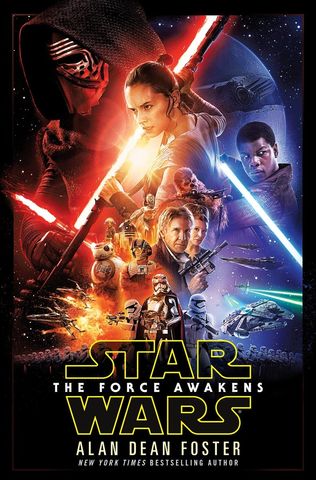 Ben W: Oof, I didn’t read the TFA novel, mostly because I’m not a huge fan of Alan Dean Foster. I think he’s an okay writer, I just didn’t figure him to be someone to elevate a film’s material as you mentioned. There aren’t a lot of authors who are willing to stretch and flex a screenplay the way it needs to be in order to make it work in a novel format. Stover did it by focusing on the emotions and motivations of the character ensemble and by using his terrific command of prose to re-color the events we already knew for sure were going to happen.
Ben W: Oof, I didn’t read the TFA novel, mostly because I’m not a huge fan of Alan Dean Foster. I think he’s an okay writer, I just didn’t figure him to be someone to elevate a film’s material as you mentioned. There aren’t a lot of authors who are willing to stretch and flex a screenplay the way it needs to be in order to make it work in a novel format. Stover did it by focusing on the emotions and motivations of the character ensemble and by using his terrific command of prose to re-color the events we already knew for sure were going to happen.
I expect better things from Alexander Freed’s work on the Rogue One novel, based on his superb work with Battlefront: Twilight Company. The latter book is a grim and gritty tale of the front lines of a war that the Alliance cannot win without daring, willpower, and a lot of luck. I expect Rogue One to be much the same, and I would be hard pressed to think of a better author to handle the subject than Freed. He can get inside of the characters’ heads and show how the war twists and bends morality to the point where you can forget who you’re fighting for.
And really, who wouldn’t want to read Saw Gerrera as Freed will scribe him?
Moving forward, with the immense docket of films that will go basically into perpetuity, Del Rey does need to be daring, but they also have to give the novelizations to authors for whom it makes sense to give them. If you have a film that makes an effort to be more militaristic, then someone like Freed is an inspired choice. For the next spinoff film, the Han Solo movie, a writer with a strong comedic bent might fit well, since the film seems (at this early stage at least) to have a more comedic bent to it based on the creative team behind it. An author like Aaron Allston would have been perfect for that sort of story, but with his passing, perhaps John Jackson Miller would make a good choice. For Episode VIII, it’s even harder to say since we know pretty much nothing about how that story and tone will go. I’d bank on it being dramatic and weighty, though, considering the director, so I’d put an author like Claudia Gray in the driver seat for that one.
But they can’t just be adaptations, either. Del Rey has to give the authors the sort of creative freedom for them to experiment and make the stories their own. Stover did it with RotS without changing anything about the fundamental series of events, and look how that turned out. If Freed or the other future novelization authors are given that same sort of freedom, not just to view the events of the movie through their own lens but to change the dialogue, change the narration style, they can make it a strong book that stands on its own whether or not there’s a movie that covers the same events. It’s a tall order. But Del Rey has some great authors working for them now and there are plenty of others out there who would be able to do it as well.
Jay: I don’t like straight novelizations — and the TFA novel was essentially just that, an adaptation of a certain version of the TFA script and it did little more than that. I said that all I wanted out of the TFA novelization was The Journal of the Whills, and to be fair I got exactly that, so I’m not complaining *too* much. But I want something more, and the notion of novelizations eating time from other novels really bothers me.
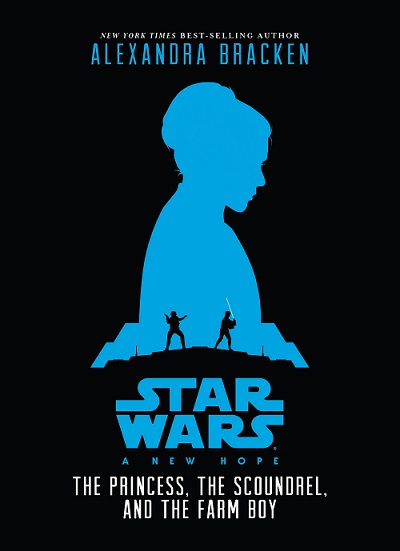 But I’m not against the notion of a novelization at all. Far from it. I think with experimentation, a novelization could become a really interested value add. We don’t even need to look as far back as the ROTS novelization. Disney-Lucasfilm Press recently did those middle grade OT adaptations. Each author was asked to adapt one of the OT films for younger audiences in whatever way they saw fit. I really liked that series because it produced three very different books with very fresh takes. Not all of them worked for me (though Alexandra Bracken’s ANH adaptation is among my favorite books in the new canon, period) but I’m very pleased with that publisher’s willingness to experiment.
But I’m not against the notion of a novelization at all. Far from it. I think with experimentation, a novelization could become a really interested value add. We don’t even need to look as far back as the ROTS novelization. Disney-Lucasfilm Press recently did those middle grade OT adaptations. Each author was asked to adapt one of the OT films for younger audiences in whatever way they saw fit. I really liked that series because it produced three very different books with very fresh takes. Not all of them worked for me (though Alexandra Bracken’s ANH adaptation is among my favorite books in the new canon, period) but I’m very pleased with that publisher’s willingness to experiment.
I think Del Rey could do the same thing. I’ve said before that I enjoy how Del Rey uses short stories as a way to bring in new authors. I’m also glad that Del Rey is willing to bring back authors who’ve really resonated with audiences, bringing Claudia Gray to write Bloodline after her Disney-Lucasfilm book Lost Stars proved to be a hit and using Alexander Freed to write Rogue One after his breathtaking debut in Twilight Company. So I don’t automatically think novelizations won’t work out, because Del Rey’s testing new talent and using talent that works — and that’s a good start.
But talent alone won’t cut it. Alan Dean Foster isn’t untalented — I actually really like the original ANH novelization — but the TFA novelization was dry. And Gray, Freed, Bracken, or anyone else could write a new movie novelization and it would still be dry if it just followed the film very closely. I’d want more.
So I think what I would want Del Rey to do with its novelizations is something akin to what Disney-Lucasfilm did with the OT kid stuff: let the authors get creative. Let them tell the story how they want to tell it. Now, I don’t know if that’s a reasonable ask: authors might not have enough information about a film in advance to truly get creative in the way I’m thinking of. They certainly won’t have seen the film before the books are already done and ready for publication. But I think it would be worth it, and I think audiences would get more out of it — and I don’t think they’re any less novelizations for it either, but I’m scarcely an expert in publishing lingo.
But the bottom line is I’d want something different. If we have to use a precious publishing slot on it, I’d want it to be something I’m really excited to read. (And I mean, let’s be real, I’ll read the film novelizations anyway but you know what I mean).
Ben C: Hmm, novelizations, so that leads to Brooks vs Stover! I enjoy Brooks’s work a lot, mostly because it’s reliable entertainment. It doesn’t try to be more than that, it’s just a good story, probably a familiar one after you’ve read a few Shannara books but that’s not always a bad thing. Stover goes for a far more intense style so of course that works for a novelization of Revenge of the Sith. However, in both cases, despite Brooks giving us Darth Bane, if it was at the expense of an interesting, good and original work, without the good not being original and the original not good, then that would be cause for being somewhat miffed.
On the other hand, given his Star Wars debut, I can’t deny that Freed being on point for the Rogue One novelization immediately raises it up quite a bit. Enough that I might have to consider buying it, if only to see how it goes and dovetails with Luceno’s Catalyst – we know they’re going to, don’t we?
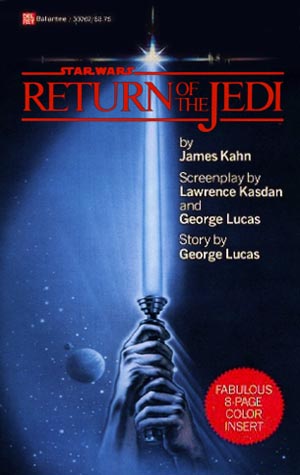 At the same time, it can’t be denied that novelizations can sometimes seed little things that then take on a life of their own. Like Glut’s weaving in of the idea that, without the Emperor being alive, the Imperial Fleet at the Battle of Endor quickly collapsed. Who knew at the time that years later Zahn would really run with that little concept in Heir to the Empire?
At the same time, it can’t be denied that novelizations can sometimes seed little things that then take on a life of their own. Like Glut’s weaving in of the idea that, without the Emperor being alive, the Imperial Fleet at the Battle of Endor quickly collapsed. Who knew at the time that years later Zahn would really run with that little concept in Heir to the Empire?
Let’s borrow the notions of additionality or added value. Any novelization will be at a certain level automatically due to being linked to a film, but that will not boost it as much as may be thought because novelizations tend to sell to a fairly niche audience. So clearly something is needed to expand the appeal and boost the interest so as to get more sales. Material not in the film, expansion of key sequences, use of the novel form to give insights into the characters film can’t, or rather, not without a ton of exposition. All valid options. For me there has to be, in some form, that extra value and lots of it – getting a book version of Star Wars: Film X doesn’t cut it.
David: I am not a novelization person. My wife owns all of them, but I just bought Return of the Jedi and Revenge of the Sith after hearing from many trusted sources that they offered a new angle. I read the TFA novelization, and it felt like a waste of time. So yes, definitely, I’m not interested in written versions of a movie if they are not going to add something substantially different. Different media, different approach. I don’t want to read the script with “he said” and “she replied” added at strategic points.
So yes, I am okay with any kind of experimental approach, although I’m not sure calling it experimental is too accurate: we’ve been doing this forever. I would’ve loved if the TFA novel had been split between the POVs of the two characters that we first meet, Poe and BB-8, seeing all of the unfolding events through their eyes. Or what the hell, let’s go bold. Let’s take the approach that Arthur C. Clarke and Stanley Kubrick took while developing 2001: A Space Odyssey: develop the novel parallel to the script and diverge whenever the book is better served by a different choice. Would the book be better if the final dogfight was instead a battle of the wills between two admirals leading two opposed fleets? If Starkiller Base had been something less visually spectacular but more interesting, like a psychic weapon that fed on fear, earning that “adult novel” moniker by delving deep into the characters’ psyches and fears? If BB-8 had a face, so you could describe his expressions better? Or simply if the author had used a slower, more deliberate pace, taking time depicting how the galaxy has changed instead of jumping straight into the action? That’s all fine by me. I’d rather have an “inspired by” novel than a bland book that adds nothing new.
I trust that Alexander Freed is bringing something new to the table. It’s a bold statement, but I feel no shame in saying that Twilight Company is my favorite Star Wars novel EVER, and I don’t remember enjoying a Star Wars book this much since Han Solo At Stars’ End and Heir to the Empire. So hey, no pressure, Mr. Freed!
Rocky: I love Revenge of the Sith. It is by far the best movie novelization I’ve ever read, and in my top five Star Wars books of all time. It’s a very unique novelization, and isn’t the usual tone of any movie novelization. However, that kind of unique tone, the prose and descriptions, and all the little quotable bits, aren’t something easily replicated. We shouldn’t expect it to be replicated, because that isn’t really the point of a movie novelization.
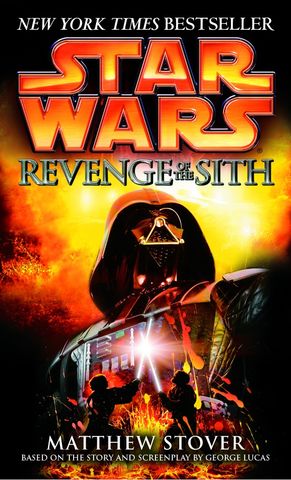 When I’m reading something like that, I’m mostly expecting a summary of the movie, in book form. Something I can read after the movie, and just fill in my memory about character names I didn’t quite catch or smaller plot details that I wasn’t entirely sure on. It’s rare that I read a movie novelization that really changes my view of the movie and has enough unique tone and insight to really leave me thinking later on. The quandary is, finding a balance. Movie novelizations don’t have to be great literature or compelling stories, and if they are, it’s incredible and glorious. The more usual written summary of the movie is perfectly fine, and if we’re getting a movie every year, that’s about all people are going to expect out of movie novelizations. Though we are getting fewer novels published a year, we are getting some excellent ones, and the volume is just at a good spot to get good Star Wars books without feeling overwhelmed.
When I’m reading something like that, I’m mostly expecting a summary of the movie, in book form. Something I can read after the movie, and just fill in my memory about character names I didn’t quite catch or smaller plot details that I wasn’t entirely sure on. It’s rare that I read a movie novelization that really changes my view of the movie and has enough unique tone and insight to really leave me thinking later on. The quandary is, finding a balance. Movie novelizations don’t have to be great literature or compelling stories, and if they are, it’s incredible and glorious. The more usual written summary of the movie is perfectly fine, and if we’re getting a movie every year, that’s about all people are going to expect out of movie novelizations. Though we are getting fewer novels published a year, we are getting some excellent ones, and the volume is just at a good spot to get good Star Wars books without feeling overwhelmed.
I don’t know how I’d feel about another Revenge of the Sith style novelization. I absolutely love the book, and it’s truly outstanding. However, I don’t expect every single movie novelization to be at that level of unique! The authors tapped for novelizations lately seem to be well-aligned with what they’re good at- tie-ins in general, military fiction- and that’s a good thing to make the novelization work well for filling in the details of the movie. If we can get another Revenge of the Sith, in terms of quality and detail? That would be amazing. Do I expect it? Not really, since it’s such a unique work and I doubt anyone but Matt Stover could come up with something like that. Though if Stover gets assigned another movie novelization, I’ll certainly be first in line to buy it.

The old adage used to be “The book was better than the movie.” That’s what you hear about all the novels that get turned into films. Well, in those cases, you are condensing a novel into a film – you lose something in the process.
Generally speaking, if the movie comes first, the movie is better than the novelization. Why? Well, you lose the impact of the visuals, and what do you get in return? Stover’s novelization was good because it *added* to the story. In fact, the most interesting part of most novelizations tend to be the scenes that are cut from the film, or things that expand and go beyond what you see.
If we’re going to have novelizations, they ought to work as expansions and explanations of the film – they ought to move beyond them. Be almost 1.5 versions of the film, with extra bonus content or something. I liked the extra little snippets we got in TFA’s novelization… there just weren’t enough of them. Stover gave you so much more than just the book – the way he handled the first sequence, Mace’s conversation with Obi-wan before sending Obi-wan after Grevious. Great “bonus” stuff.
If the novel is basically the bonus pack – then it will work.
I like the “version 1.5” thing–that’s a good way to put it! Or in video game parlance, it’s the Ultimate Edition with all the DLC added. 🙂
Isn’t this what the “Lego Star Wars” series sort of does — it gives bonus levels filling in blanks, extra adventures.
… I’d almost rather see a novelization of Lego Force Awakens…
That was scary. I need coffee.
And then an R-rated film adaptation of the novelization of the Lego game. :p
I would be really curious to see this discussion revisited now that we have all five novelizations for the first five new films. I think there’s a lot of reasons to revisit an article like this:
-First, in my opinion, both Solo and Rogue One were served well by their novelizations, for different reasons. I think the Solo novelization did a really good job of bringing the themes of the film to the forefront of the novel, helping us see the thematic overtures of the script in greater clarity. I’m not going to say that the movie was particularly deep, but it does have some points to make, and the novel brought those out fairly well. Rogue One was helped by adding some key scenes (like the discussion between Mon Mothma and Jyn) and by drawing stronger ties to Catalyst.
-Second, after the release of the TFA novel, the marketing really started to push them as “Extended Editions”. A great question to ask is, “why”? Was it a response to fans not thinking that novelizations were worth their time? When they come out after the digital release, and are released alongside the comic adaptation and young reader edition, maybe they aren’t. But it could also be worth asking if those deleted scenes really gave any more depth to the film, or if they were simply bonus content that could have really stayed on the cutting room floor. I would say the bonus content in Solo is fairly inconsequential, whereas the content added in the Last Jedi novelization was really, really good and was a worthy addition to the novel.
-Third, with Rise of Skywalker, we saw people really, really, really lean into the novelization as a “save” for the movie. Lots of people – for a myriad of reasons – really leaned into the novelization to fix the movie: some wanted it to give more breathing room to scenes that were too fast in the film, some wanted it to change the ending..etc. Is it fair to expect a novel to do this much? Maybe another thing people were relying on was Rae Carson, a woman, to help the portrait of Rey, who has had few women writing her story lately.
-Fourth, uh, the pushback to the novelization, especially with regards to the kiss. Maybe a good question to revisit is whether or not novelizations are a good means of adapting the film. Rise of Skywalker is a fast-paced action flick: was a novel ever going to handle that well? The strength of a novel is getting into the characters’ heads, but does that define too much, set too much in stone (like the kiss)? I also remember pushback about the form/structure of The Last Jedi, especially with the way that Fry described the Holdo maneuver in more technical detail, whereas the film relied a lot on the spectacle of light and lack of sound.
-Fifth, maybe, but this is more esoteric: in review, did the five novels really succeed? And, if they did or did not, what were they to succeed in? Should we expect more canon connections? Should Rogue One have referenced Catalyst more? Should The Last Jedi have made more references to Vrogas Vos or Kier? Should they have simply retold the movie for people who did not have access to the movie?
eh. Anyway. This was a fun read a couple years later. Thanks for writing it, all.
after the release of the TFA novel, the marketing really started to push them as “Extended Editions”. A great question to ask is, “why”? Was it a response to fans not thinking that novelizations were worth their time?
This is interesting because my assumption then and now was that novelizations are as close as licensed SW novels get to a quick, guaranteed buck—interest in the movie is always going to outshine interest in an original story so what they lack in creative freedom they make up for in sales and new eyeballs. But the “Expanded Edition” branding could suggest TFA didn’t do as well as novelizations would have been expected to historically.
The strength of a novel is getting into the characters’ heads, but does that define too much, set too much in stone (like the kiss)?
I think ROS is in a pretty unique situation on that front and I would hate to think that we’d arrived at a place where it’s better for us to not understand why the main character makes the choices she does. To the extent it didn’t work in practice I think that’s a failing of the film—it’s not like they let Rae Carson just decide for herself what the kiss was about.